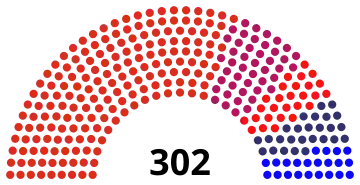1946 North Vietnamese legislative election
| |||||||||||||||||||||||||
302 of the 403 seats in the National Assembly | |||||||||||||||||||||||||
This lists parties that won seats. See the complete results below. | |||||||||||||||||||||||||

 |
|---|
|
|
National Assembly elections were held in areas controlled by the Democratic Republic of Vietnam on 6 January 1946.[1] They resulted in a victory for the communist-dominated Viet Minh. Purportedly, communists won 182 of the 302 seats.[2] Official documents indicate that 333 representatives were elected, plus 70 appointed representatives (50 from Quốc dân Đảng and 20 from Đồng minh Hội) under a pre-election agreement.[3]
The ballot was not secret and ballot papers were filled out in the presence of aides who were "to help comrades who had difficulty in making out their ballots."[4] The election was tightly controlled by the communists and was not genuinely democratic. Communist partisans and Viet Minh members were instructed to run for seats without disclosing their affiliations. Their goal was to fill the National Assembly with loyal Party supporters.[5]
Background
On 8 September 1945, six days after the proclamation of independence, Ho Chi Minh signed decree 14 on the National Assembly elections. On 17 October he signed decree 15 detailing the regulations for the elections;[6] turnout was required to be at least 25% to validate the results,[7] all citizens over the age of 18 had the right to vote, and those over 21 could stand as candidates. On 11 November, as an effort to alleviate the fears of a Communist takeover, the Indochinese Communist Party announced its dissolution. However, it remained de facto in existence and in control of the Viet Minh.[8]
Conduct
The elections were opposed by the French colonial authorities and their supporters, and were marked by bombings and "misinformation".[9]
Results
According to Ho Chi Minh, voter turnout was approximately 82%.[10] Other sources put turnout at 89%.[7] Ho Chi Minh received the highest vote share (98.4%) of any candidate.[11]
 | ||
|---|---|---|
| Party | Seats | |
| Indochinese Communist Party | 182 | |
| Democratic Party of Vietnam | 45 | |
| Socialist Party of Vietnam | 27 | |
| Việt Nam Quốc Dân Đảng | 26 | |
| Vietnamese Revolutionary League | 22 | |
| Total | 302 | |
| Source: Hartmann (2001) | ||
References
- ^ Christof Hartmann (2001). "Vietnam". In Dieter Nohlen, Florian Grotz & Christof Hartmann (ed.). Elections in Asia: A data handbook, Volume II. p. 331. ISBN 0-19-924959-8.
- ^ Hartmann (2001), pp. 325, 336
- ^ "Danh sách Đại biểu Quốc hội khóa I nước Việt Nam Dân chủ Cộng hòa". Văn kiện Quốc hội Toàn tập: Tập I. Nhà xuất bản Chính trị quốc gia. 2006. Archived from the original on 16 September 2008.
- ^ Hartmann (2001), p. 324
- ^ Holcombe, Alec (2020). Mass Mobilization in the Democratic Republic of Vietnam, 1945–1960. University of Hawaiʻi Press. p. 34. ISBN 9780824884475. JSTOR j.ctv105bb0z.
- ^ Tổng tuyển cử đầu tiên và sự hoàn thiện, phát triển các chế định bầu cử ở nước ta ChungTa
- ^ a b Cuộc tổng tuyển cử đầu tiên năm 1946 - Một mốc son lịch sử của thể chế Archived 2016-06-28 at the Wayback Machine HoChiMinh City University
- ^ Jacques Dalloz, La Guerre d'Indochine 1945-1954, Seuil, 1987, p92
- ^ 6-1-1946: Tổng tuyển cử Quốc Hội khóa I Lich su Viet Nam
- ^ Những cuộc trả lời phỏng vấn báo chí của Bác Hồ (Phần 2)
- ^ "79 năm Ngày Tổng tuyển cử đầu tiên bầu Quốc hội (6/1/1946 - 6/1/2025)". NVSK. January 2025.
External links
- Howard R. Penniman (1972) Election in North Vietnam World Affairs
- "Danh-sách các Vị Đại-biểu do cuộc Tổng-Tuyển-cử bầu ra..." (pp. 212–216). Việt Nam Dân Quốc Công báo number 15, April 13, 1946.